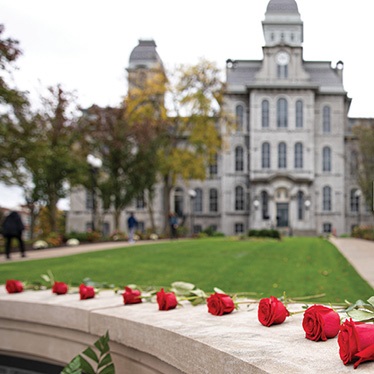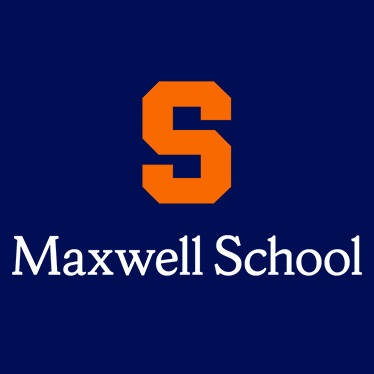
Maxwell’s Student-Run History Journal ‘Builds a Vibrant Community’
April 29, 2025
CHRONOS is celebrating its revival, a milestone anniversary and special recognition from the Syracuse Office of Undergraduate Research and Creative Engagement.
In front of an audience of fellow undergraduates and History Department faculty, Maxwell School junior Jorge Morales recently shared his research findings on the 2016 Rio Olympics–specifically, the intersection of race and infrastructure in the event’s planning and legacy.

Morales’ interest in the topic was sparked by childhood memories of watching the competitions for hours on television. Referring to a well-crafted PowerPoint, he shared his argument that the marginalization of Rio's urban poor by infrastructure projects supporting the Olympics was part of a century-long pattern by the Brazilian elite to project an image of modernity to the world.
His was one of six student presentations during the 4th Annual CHRONOS Undergraduate Research Conference. The day-long event in Bird Library was held in early April in support of the undergraduate history research publication CHRONOS.
In addition to student presentations, it featured a panel discussion exploring the theme “What Does it Mean To Be a Historian?”
The conference was also a celebration. CHRONOS was revived in 2024 after a few years’ hiatus following the COVID pandemic. In addition, the publication recently marked the 20th anniversary of its founding and received a major honor: The Syracuse Office of Undergraduate Research & Creative Engagement (SOURCE) Award for Innovation in Undergraduate Research Support.
The SOURCE award, presented at the Spring Showcase Orange Talks and Award Ceremony on March 27, honored CHRONOS for building new opportunities for undergraduate research and creative activity.
“CHRONOS is a long-established student-led journal providing opportunities for students to learn about academic publishing and share their work,” wrote SOURCE Director Kate Hanson in a letter informing the eight-member student editorial board of the award. “The revival of CHRONOS in 2024 with a rich new volume and engaging day-long conference event, activities which are continuing in 2025, builds a vibrant community around historical research.”
Robert Terrell, assistant professor of history, serves as CHRONOS’ faculty advisor. He said the publication and related research conference is “meaningful and important” for students for the hands-on learning experience it provides and because undergraduates are not often provided opportunities to publish their work.

“This experience is something they can look back on and remember,” he said. “It's really the fruit of their own labor.”
Though Terrell provides mentorship, the publication is entirely student-run. Students have the freedom to pursue research on the topics they care about most and build the skills to share it with others.
“In general, history students do most of their work independently, but on CHRONOS they learn the fine art of teamwork,” said Norman Kutcher, professor of history and Laura J. and L. Douglas Meredith Professor for Teaching Excellence. “Together they produce a product that they can be proud of. For our faculty, and especially for our CHRONOS faculty advisors, it is exciting to watch.”
Kutcher and Samantha Herrick, associate professor of history, founded CHRONOS as a way for students to engage with faculty research. It evolved into a platform for undergraduates to publish original work, complete with a peer-review process–a hallmark of the journal publication process.
Morales attended his first CHRONOS meeting last year. He was taking a class with Albrecht Diem, professor of history, who helped revive CHRONOS after its COVID hiatus.
“I loved everything about it,” said Morales of the publication and its editorial board. “It's a community of people who are dedicated to having tough conversations about the world because we each have very different backgrounds and very different perspectives.”
Abbey Fitzpatrick, a junior studying political science and history, serves on the editorial board and likewise appreciates the sense of community.
“There are spaces for undergraduate research, but I feel like sometimes it can be very daunting. With CHRONOS, we really try to help guide people, even if they're not a history major,” said Fitzpatrick.
Gillian Reed, a junior studying history and psychology, emphasized how rare it is for undergraduates to have this opportunity. “Not a lot of universities have places for history students to publish their work,” she said, noting that fewer than 10 active journals exist for undergraduate history research across the country.
This year, a student traveled from SUNY Binghamton to present her research–the first non-Syracuse University student to participate in a CHRONOS conference. Isabelle Aiken’s talk, “A Movement Divided: How the 1977 IWY Conference Exposed Intra-Movement Conflict and Fueled STOP ERA,” dealt with the fragmentation of the women’s movement in the U.S.

Other topics at the conference included Ronald Reagan’s ties to the FBI during the Iran-Contra Affair, legal responses to the opioid crisis in Onondaga County, New York, and an exploration of how children’s entertainment served as propaganda in Nazi Germany.
The panel discussion was moderated by Morales and included Fitzpatrick and fellow undergraduate Sara Park along with Terrell, Associate Dean Gladys McCormick and graduate student Cameron Kline. Their focus on the diverse roles of historians built on concepts raised by last year’s theme, “History Under Attack,” and aimed to reflect on the responsibilities of studying history today.
“The idea was to try to continue that conversation about the stakes of doing historical work, especially at a moment when there's so many claims to different kinds of histories,” said Terrell.
Volume 16 of CHRONOS will be printed this fall.
“It’s a legitimate publication, complete with DOI and ISSN numbers,” said Terrell. “It’s something that will last and continue to have impact beyond the moment of its publication, and it testifies to the strength of the history program and history students at Syracuse.”
By Mikayla Melo
Related News
School News

May 1, 2025
School News

Apr 25, 2025
School News

Apr 24, 2025
